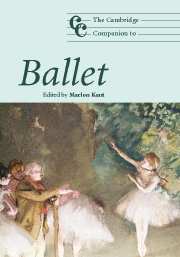Book contents
- Frontmatter
- Introduction
- Part I From the Renaissance to the baroque: royal power and worldly display
- Part II The eighteenth century: revolutions in technique and spirit
- Part III Romantic ballet: ballet is a woman
- Part IV The twentieth century: tradition becomes modern
- 17 The ballet avant-garde I: the Ballets Suédois and its modernist concept
- 18 The ballet avant-garde II: the ‘new’ Russian and Soviet dance in the twentieth century
- 19 George Balanchine
- 20 Balanchine and the deconstruction of classicism
- 21 The Nutcracker: a cultural icon
- 22 From Swan Lake to Red Girl's Regiment: ballet's sinicisation
- 23 Giselle in a Cuban accent
- 24 European ballet in the age of ideologies
- Notes
- Bibliography and further reading
- Index of persons
- Index of ballets
- Subject index
- The Cambridge Companion to Music
23 - Giselle in a Cuban accent
from Part IV - The twentieth century: tradition becomes modern
Published online by Cambridge University Press: 28 September 2011
- Frontmatter
- Introduction
- Part I From the Renaissance to the baroque: royal power and worldly display
- Part II The eighteenth century: revolutions in technique and spirit
- Part III Romantic ballet: ballet is a woman
- Part IV The twentieth century: tradition becomes modern
- 17 The ballet avant-garde I: the Ballets Suédois and its modernist concept
- 18 The ballet avant-garde II: the ‘new’ Russian and Soviet dance in the twentieth century
- 19 George Balanchine
- 20 Balanchine and the deconstruction of classicism
- 21 The Nutcracker: a cultural icon
- 22 From Swan Lake to Red Girl's Regiment: ballet's sinicisation
- 23 Giselle in a Cuban accent
- 24 European ballet in the age of ideologies
- Notes
- Bibliography and further reading
- Index of persons
- Index of ballets
- Subject index
- The Cambridge Companion to Music
Summary
In New York, on 2nd November, 1943 Alicia Alonso, a Cuban ballerina, danced the title role of Giselle replacing a sick Alicia Markova in a performance of Ballet Theatre.
In 1943, a Cuban ballet dancer was a rarity, even more if she starred in a work considered the epitome of the European Romantic tradition. Though Cuba was immensely popular in the United States in the 1940s, it was by no means associated with ballet. Since the early 1920s, Hollywood and Broadway had made Americans familiar with images of Cuba as an exotic destination offering exuberant women, hot rhythms, beaches, casinos and endless nights of romance and alcohol. I'll See You in Cuba (1920), The Cuban Love Song (1931), Girl from Havana (1940) and Week-End in Havana (1941) were among the era's numerous films and musicals with Cuba as their subject or background. Cuban songs topped American charts while rumbas, congas, cha-cha-chas and mambos took centre stage in dance halls from New York to Los Angeles.
Rising to fame as a ballet dancer and becoming one of the most celebrated Giselles of the twentieth century, Alonso undermined Americans’ stereotypical images of Cuba and Cubans. She also challenged the assumption that ballet belonged to Europeans. Asked about the reactions that her nationality elicited at the beginning of her career, she said: “A lot of people were astonished. I danced the more classical works, like Giselle and Swan Lake. In my first visits to England and France, the audience could not believe that a Latina represented classicism. In England, a critic even asked me how I had the courage to dance Giselle. Regardless of their disbelief, I achieved success”.
- Type
- Chapter
- Information
- The Cambridge Companion to Ballet , pp. 263 - 271Publisher: Cambridge University PressPrint publication year: 2007



